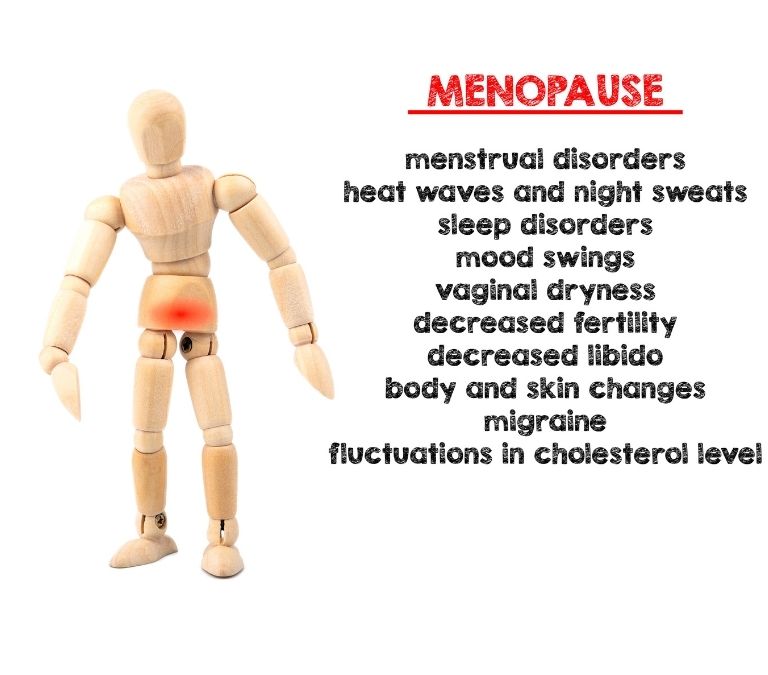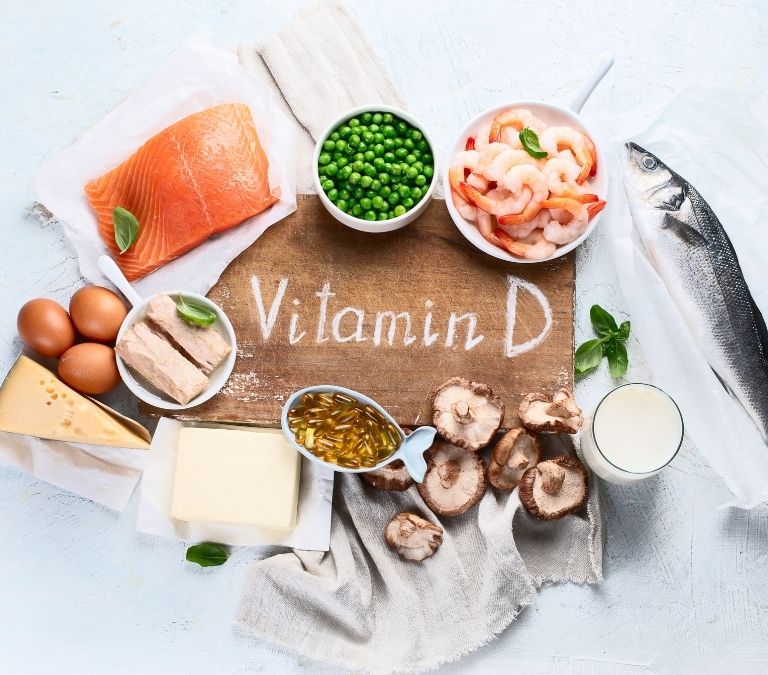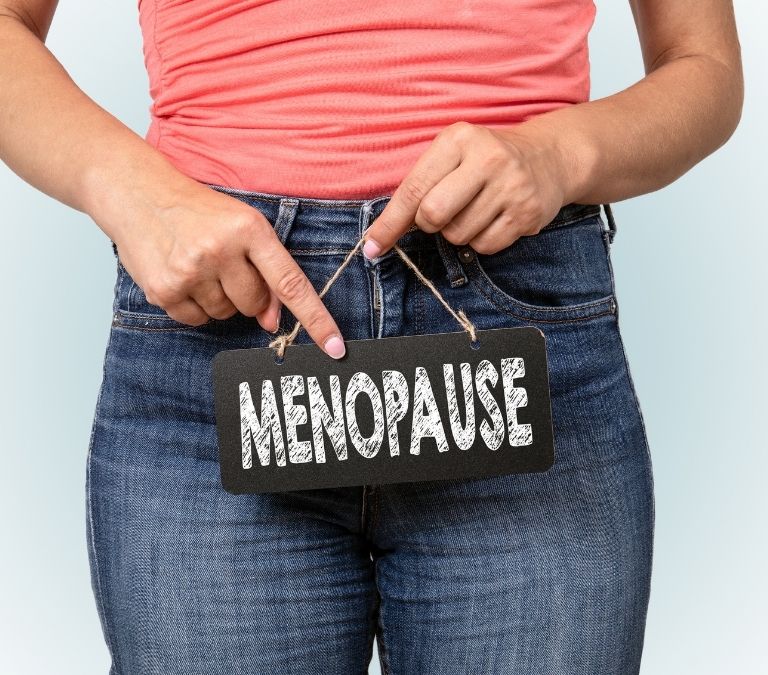At a point in a woman’s lifetime, her body undergoes various changes as part of the aging process. One such change is menopause. The onset of menopause signals the start of a new phase in a woman’s life, which could be overwhelming, especially when the woman undergoes some disturbing symptoms. Usually, menopause sets in between the ages of 48 to 58, with the first signs being irregularities in the menstrual cycle.
Once a woman between the ages of 48 to 58 experiences an absence of menstrual flow for 12 months, she has entered the menopausal stage. At this stage, the ovaries stop working, and the secretion of estrogen and progesterone is responsible for the menstrual cycle stopping. Menopause itself is not a process but a single timeframe of 12 months which the woman undergoes until she moves to the next phase, which is the post-menopausal stage.
Each individual is different, so it can be expected that no two women would share similar menopausal experiences. While some might have an intense menopausal experience with several physical and emotional changes, others only experience minimal or no menopause symptoms. However, menopause is not a health problem, so even if you experience multiple physical and emotional symptoms during menopause, rest assured that the phase will only last a few months and will pass.
Some of the more common symptoms of menopause include:

- Irregular menstrual cycle
- Hot flashes
- Vaginal dryness
- Weight gain
- Mood swings
- Sleeping difficulties
- Chills
- Hair and skin changes
- Night sweats
- Irritability
- Fatigue
- Urinary incontinence
- Reduced sex drive
- Headaches
- Heart palpitations
- Depression
These symptoms usually stem from physical changes and a decline in hormonal levels in the body. As mentioned earlier, menopause is not a health problem but a normal phase of life in every woman. Therefore, it does not require any treatment, but the symptoms can be alleviated if they become severe and unbearable. Hormone therapy, oral contraceptives, antidepressants, and non-hormonal treatments can be administered to help alleviate the symptoms of menopause in women. Many women also turn to natural methods and home remedies to help manage these symptoms and provide relief.
How To Naturally Reduce Symptoms Of Menopause
Maintain a healthy weight

Several studies have linked menopause to weight gain in women. This is due to decreased estrogen levels, genetics, aging, and lifestyle changes. It is easy to pack on extra pounds and fat during menopause, and the extra weight is not always easy to shed. Research has linked excess weight gain, especially during middle age, to type 2 diabetes, heart diseases, and breathing troubles. Gaining unwanted body fat could also elevate the risk of developing cancerous tumors later.
A study of menopausal women discovered that post-menopausal women who shed close to 10 pounds of body weight within a year were less likely to undergo hot flashes and break into night sweats. Weight gain during menopause can be controlled by watching one’s diet, exercising, and lifestyle changes. Maintaining a healthy weight during menopause could help lessen the severity of the menopausal symptoms and reduce the risk of developing the ailments menopausal women are predisposed to.
Regular exercise

Staying physically active during menopause has been linked to alleviating vasomotor menopausal symptoms like hot flashes in some women. Studies have shown that aerobic exercises and resistance training for about 150 minutes per week can help reduce excess body fat in menopausal women and build their muscles. Additionally, regular exercise can help reduce stress, better sleep, and enhance the body’s metabolism.
If you do not engage in physical activities before menopause, adopting the lifestyle in mid-life could be difficult. However, you can transition into a more active lifestyle by simply changing your routine. For example, using the stairs instead of the elevator, walking the dog, gardening, and other activities can be integrated into one’s schedule.
By combining resistance training with aerobics and balance exercises, an overall positive effect will be observed physically and mentally. You can also incorporate yoga into your exercise routine as it helps to reduce irritability and hot flashes. In addition, since yoga combines exercise with meditation, the body relaxes after each session, improving the sleep quality of many women. Exercising regularly also helps to reduce the risk of health conditions like diabetes, obesity, osteoporosis, cardiovascular diseases, high blood pressure, cancer, and stroke in menopausal women.
Eat foods rich in Calcium and Vitamin D

One of the major illnesses women going through menopause are predisposed to is osteoporosis. Osteoporosis causes the bones to become weak and brittle, causing bone fractures and bone loss. Its risk is increased in menopausal women due to the low estrogen levels in the body. Consuming foods rich in calcium and vitamin D could help lower this risk as they help boost bone health.
Vitamin D aids the absorption of calcium, thereby enhancing home formation. In addition, vitamin D has been proven to help reduce the risk of hip fracture caused by osteoporosis in post-menopausal women. The primary source of vitamin D is sunlight, as your body produces the vitamin itself. But women going through menopause might not be able to absorb the sunlight efficiently to produce vitamin D due to aging. Therefore, you can make up the difference by taking supplements or leveling up on foods with natural vitamin D.
Cod liver oil, eggs, oily fish, cheddar cheese, soy milk, lentils, and mushrooms are excellent sources of vitamin D. Calcium can be obtained from dairy and non-dairy foods. Yogurt, cheese, and milk contain calcium in high quantities. It can also be obtained from non-dairy sources like chia seeds, collard greens, kale, beans, tofu, soy milk, fruit juice, and spinach. Adopting a diet fully fortified with calcium and vitamin D alleviates menopausal symptoms and boosts bone health in post-menopausal women.
Eat more Fruits and Vegetables

Fruits and vegetables are packed with useful and powerful nutrients that can help manage menopausal symptoms. Fruits and vegetables contain low amounts of calories, so when they are consumed, you feel full quicker. With this, weight loss, as well as weight maintenance, can be achieved faster and easier. Additionally, several fruits and vegetables are great sources of vitamin D and calcium, which help maintain bone health.
A certain study of a select group of women going through menopause showed that those whose diet contains high levels of fruits and vegetables had a lesser bone breakdown when compared to their counterparts. In addition, fruits and vegetables have also been linked to a lesser risk of developing cardiovascular diseases and other health conditions menopausal women are at a higher risk of developing.
Since they help with weight loss and maintenance, the body has lesser fat and cholesterol, increasing the risk of heart diseases. In addition, many fruits like watermelon and cucumber help increase hydration levels which have been proven to help reduce hot flashes and recurrent urinary tract infections.
Add more Phytoestrogen-rich foods to your diet

Phytoestrogens are naturally occurring compounds found in plants whose functions in the body are similar to that of estrogen. Since low estrogen levels in the body cause menopause, phytoestrogens could help balance the hormones and increase their levels in the body from an alternative source.
A study that followed the lifestyle of Asians has opined that their increased intake of foods high in phytoestrogen made the menopausal women experience little to no hot flashes. Phytoestrogens can be found in foods from soy like soybeans, tofu, tempeh, and edamame beans. In addition, Linseeds, sesame seeds, miso, broccoli, and flaxseeds are also great sources of phytoestrogens.
A recent study corroborated the effectiveness of phytoestrogens by evaluating the effects of soy-rich diets in menopausal women. It found that lower cholesterol levels and high blood pressure were observed. Also, the women with soy-rich diets experienced lesser hot flashes and night sweats. However, phytoestrogens are better consumed in their natural form than in supplements or processed foods. They are better absorbed this way and pose lesser risks. It is important to note that soy-tolerant women have to get their phytoestrogens from other non-soy sources. Also, seeking a doctor’s or dietician’s advice is important when considering phytoestrogen supplements.
Lower intake of processed foods and refined sugar

Studies have shown that making simple lifestyle changes and dieting is an effective way of alleviating menopausal symptoms. Processed carbs and refined sugar are linked to high blood sugar, which causes fatigue and irritability. In addition, the sharp rises and dips in blood sugar have been shown to increase the chances of depression in post-menopausal women. Processed foods are exposed to several processes and additives that contain chemicals that could be harmful to the body. Processed foods include white bread, processed meats, and pastries. In addition, it would help to cut down on carbonated and sweetened drinks as they are full of unnecessary calories.
A study that observed the lives of selected women between 50 to 59 showed that those whose diets are primarily made of processed foods and snacks had poor bone health. This increases their risk of developing osteoporosis, making the bones weak and brittle.
Additionally, eliminating processed foods and refined sugar from one’s diet helps with weight loss and maintenance. They can be replaced with healthier dietary options. Therefore, being conscious of the intake of refined carbs and sugar helps reduce the risk of menopausal depression and poor bone quality.
Stay hydrated

Several studies have established that drinking water regularly helps reduce hot flashes and night sweats in menopausal women. Drinking between 8 to 12 glasses of water per day keeps the hydration levels up. Reduced estrogen levels primarily cause vaginal dryness experienced during menopause.
It could be frustrating and cause problems, especially for women who are sexually active during menopause. Vaginal dryness makes sex painful and might cause bruising due to less or non-lubrication of the vagina. Staying hydrated helps reduce this symptom by increasing vaginal lubrication. Low hormonal levels have also been linked to bloating or constipation during menopause.
The digestion process is boosted by staying hydrated, making bowel movement easier. Water also gives a full feeling with lesser food, thereby helping you lose weight and maintain weight. Urinary tract infections which are common during perimenopause, can also be prevented with regular water intake. Besides water intake, hydration levels can be kept up by consuming watermelon, soups, lemons, cucumber, etc.
Stress management

Higher stress levels can aggravate menopausal symptoms. Stress causes psychological symptoms like irritability and fatigue to be more intense. Also, when the stress levels are high, the concentration drops, and even the memory becomes fogged. Adrenaline and cortisol hormones regulate stress responses in human beings. Once an individual starts to age and the production of these hormones declines, the other primary hormones in the body also suffer a decline, making the body’s response to stress abnormal.
Menopause sets in during mid-life when several women are battling major life challenges like divorce, illness, work demands, raising teenagers, caring for aged parents, etc. This leads to physical stress, which weighs down the mind and could cause depression and interfere with sleep. Learning to reduce stress and make your mental health a priority is a highly needed skill to survive this stage.
Yoga, meditation, Tai chi, and adequate rest are great ways to help the body relax and keep the stress levels down. With yoga and meditation, you can pay more attention to your body and understand your energy levels, so you do not overexert yourself. These activities also help the body sleep better and attain better mental health.
Use of Natural Supplements

Several supplemental products and remedies are available to menopausal women to help manage the symptoms. Although some have not been efficiently researched to corroborate the claims of relieving menopausal symptoms, many women still use them.
Before trying any new supplement, you should discuss its safety and potential side effects with a healthcare professional. You should also beware of supplements that claim to work better than a prescription drug or have no side effects. Common natural supplements used by women are black cohosh, Dong Quai, and phytoestrogens.
Black cohosh is produced from the buttercup plant, and some studies have shown that it helps reduce hot flashes and night sweats. It has also been observed to help manage vaginal dryness, sleep disturbances, and irritability. However, there are mixed results on the supplement’s effectiveness, so you should do extensive research and seek professional advice while considering the supplement.
The use of phytoestrogens has also been met with mixed reactions. There is not enough evidence of its effect on menopausal symptoms. Natural supplements have been shown to help manage or reduce symptoms of menopause. Still, the area lacks enough research to corroborate the claims and their safety. However, you could consult your doctor or dietician to ascertain whether they are safe for you or not.
Mindfulness training

Mindfulness training involves listening to one’s body, feelings, and physical reactions to enable you to get a grip on your thoughts. Being mindful of the thought processes has been shown to help relieve hot flashes and night sweats. In addition, concentration and positive thoughts help deal with the psychological effects of menopausal symptoms by alleviating depression and reducing anxiety.
A recent study into the effect of hypnosis showed that it helps reduce hot flashes, just like venlafaxine, a prescription drug for hot flashes.
Another type of mind-body intervention process, cognitive-behavioral therapy, has been shown to help manage mild depression and reduce the frequency of hot flashes. In addition, relaxation training and biofeedback have also been shown to reduce the rate of hot flashes and other psychological symptoms experienced during menopause. Although data is still needed in this field to ascertain safety and effectiveness, you can discuss it with your doctor and explore your options.
Menopause is not a health problem but a natural phase in every woman’s life. Although the symptoms of menopause could be challenging and seem overwhelming, you would survive the phase with the right approach and treatment. Many of the natural treatments discussed here are commonly used to help alleviate symptoms of menopause.
Although some of them lack enough scientific evidence to back up their effectiveness, you can explore the options with your doctor. However, it would help if you also remembered that some natural treatments may have side effects or may not be safe to follow due to specific health conditions. Therefore, it is important to look out for red flags in products that claim to be the ultimate cure or those with “no side effects.” As always, we recommend you consult a local healthcare professional for specific advice and recommendations.







